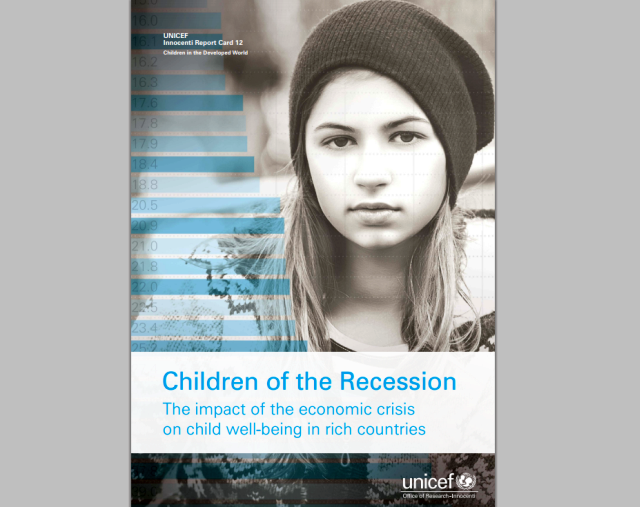UNICEF report on the well-being of children during the economic crisis
A UNICEF report reveals that over 76 million children are fighting poverty in 41 of the worlds richest countries.

România Internațional, 29.10.2014, 13:58
The figure is dramatic and alarming: since the onset of the economic crisis, in 2008, 2.6 million children have sunk under the poverty line. The surprising thing is that these are not children from the underdeveloped countries with a sad repute for challenging conditions of life, but children living in 41 EU countries and members of the Organization for Economic Cooperation and Development, that is some of the world’s richest states.
The annual report issued by the UNICEF’s research center Innocenti shows that at present the total number of children living in poverty exceeds 76 million. According to Michelle Barzach, president of UNICEF France, ‘the level of knowledge and awareness regarding the negative effects of the economic crisis on children in rich societies is insufficient.’
The UNICEF’s Head of Global Policy and Strategy, Jeffrey O’Malley, believes that ‘many affluent countries have suffered a ‘great leap backwards’ in terms of household income and the impact on children will have long-lasting repercussions for them and their communities.” According to O’Malley, ‘social protection policies are crucial for poverty prevention. All countries need strong social safety nets to protect children in bad times and in good times– and wealthy countries should lead by example, explicitly committing to eradicate child poverty, developing policies to offset economic downturns, and making child well-being a top priority.’
In 23 of the 41 countries analysed, child poverty has increased since 2008, with huge differences from one country to another: from 0.5% in Israel to over 20% in Iceland. In Greece, Latvia and Spain 36% of children live in poverty, in the US their rate is 32% and in Italy nearly 30%. In fact, Greece, Latvia and Iceland, followed by Ireland and Croatia rank last in the UNICEF classification. In the European countries worst hit by the crisis, the number of very poor children has almost doubled in the past four years.
The crisis has also severely impacted young people aged above 15, with the number of young EU citizens without proper education and jobs standing at 7.5 million in 2013. Romania is among the European countries where the number of underpriviledged young people has seen a 30% increase during the economic crisis, just like in Cyprus and Italy. In 2012, 14% of the children in Romania, 16% of the children in Italy and 14% of those in Britain were underprivileged, coming from unemployed, migrant, single-parent or numerous families.
According to the UNICEF report, in the absence of specific measures, an entire generation could be sacrificed in some countries, a real drama for children and society as a whole.






























